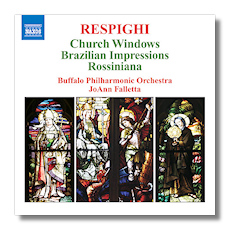
The Internet's Premier Classical Music Source
Related Links
- Respighi Reviews
- Latest Reviews
- More Reviews
-
By Composer
-
Collections
DVD & Blu-ray
Books
Concert Reviews
Articles/Interviews
Software
Audio
Search Amazon
Recommended Links
Site News
 CD Review
CD Review
Ottorino Respighi

Symphonic Impressions
- Church Windows
- Brazilian Impressions
- Rossiniana
Buffalo Philharmonic Orchestra/JoAnn Falletta
Naxos 8.557711 DDD 65:26
Respighi's most popular works aren't necessarily his best. Maybe I downgrade all three parts of the so-called "Roman Trilogy" (The Fountains of Rome, The Pines of Rome, Roman Festivals) because they are too familiar, but those who complain that Respighi's music is bombastic can get plenty of ammunition there. With The Birds and Ancient Airs and Dances, the three works on this CD are part of Respighi's "second tier," if you will, but I find them as enjoyable, if not more so, than the Roman works, precisely because they don't seem to be trying as hard to impress the listener with volume and unusual orchestral effects.
Church Windows, completed in 1925, might seem like an excuse for Respighi to illustrate four Biblical episodes or personages: "The Flight into Egypt," "St. Michael the Archangel," "The Matins of St. Clare," and "St. Gregory the Great." It seems, however, that Respighi composed the music inspired by only a generalized religious feeling, and that the titles were added after the music was completed. (I read a complaint somewhere that the Holy Family's "flight" sounds much too leisurely!) The first and third sections are contemplative, and there is some particularly delicate writing in the third. "St. Michael" is Respighi with all his stops pulled out, and seems to depict a celestial battle. The fourth section starts quietly and ends in a blaze of glory, just like "The Pines of the Appian Way." Early in the digital era, this work (and the second section in particular) was a huge hit for Chandos Records, in their recording with Geoffrey Simon and the Philharmonia Orchestra – the tam-tam crash at the end of "St. Michael" had everybody talking. Falletta and her orchestra have nothing to be ashamed of, though, and the engineering is first-class too.
Respighi and his wife Elsa traveled to Brazil in 1927, and Brazilian Impressions was the result. One might think that the local color in Rio would have inspired Respighi to write his gaudiest music, but this is a restrained score – more watercolor than oil paint. The first "impression" is of a "Tropical Night" – very mysterious! – and next, the Respighis travel to a famous herpetological institute, where the composer apparently was emotionally shaken by the snakes. The music slithers along eerily, and a sinister quotation of the medieval "Dies irae" leaves little doubt as to how Respighi felt about the experience. The last section is marked simply "Song and Dance," but even here, instead of a riot of color and rhythm, Respighi treats the Brazilian culture more impressionistically.
Respighi was adept at borrowing other composers' music. (There's merit, after all, in knowing what is worth borrowing!) The Birds and Ancient Airs and Dances draw on music from the Baroque period and earlier, and the ballet La boutique fantasque uses small piano works by Rossini as food for Respighi's imagination. In 1925, Respighi went back to Rossini, and arranged several more of the elder Italian's piano works into the suite Rossiniana. The suite progresses through a variety of moods, from the almost exaggeratedly tragic to the riotously unbuttoned, and Respighi's gifts as an orchestrator are on display throughout, especially in the brief "Intermezzo," which sparkles like a little jewel. The closing "Tarantella" is interrupted by music suggesting that someone actually died from the tarantula's bite, but once the presumed religious procession passes, the dancing starts up again, and Rossiniana ends in the highest of spirits.
With Marin Alsop, JoAnn Falletta is living proof that American women make great orchestral conductors. Falletta is Music Director of the Buffalo Philharmonic, and also the Virginia Symphony, and she seems to be particularly adept with colorful scores such as these. There are favorite alternative recordings of all three of these works (the aforementioned Simon in Church Windows, Simon and Antál Doráti in Brazilian Impressions, and Ernest Ansermet in Rossiniana), yet Falletta and the Buffalo Philharmonic can stand up to comparison with all of these, with interpretations that are both brilliant and thoughtful. In other words, Falletta seems to be telling us that Respighi doesn't have to be vulgar, and so I'd like to hear her versions of the three Roman works. These recordings were made in Buffalo's Kleinhans Music Hall, and they are gorgeously engineered. No one will be disappointed by these performances, nor by the way that they have been presented by Naxos.
Copyright © 2008, Raymond Tuttle




















